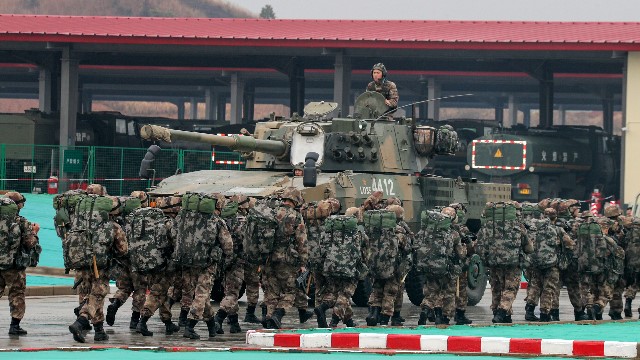The West just celebrated the 2022 New Year. China will celebrate its Lunar New Year Festival on February 1 this year. In between are a few weeks where no one knows if the world will become embroiled in conflicts ranging from Russian military intrusions in the Ukraine to Chinese naval activity near Taiwan. The political machinations of world leaders of late increases the risk of a regional war with the potential to morph into a global conflagration. The end game may be decided by which political leader has the political willpower to end it.
Not one to be left out of global leadership discussions, Chinese President Xi Jinping has added to the risk level recently with renewed demands that Indonesia, with the 7th largest GDP in the world, halt all oil and natural gas development around the Natuna Islands in the South China Sea. China also is claiming the Japanese-owned Senkaku Islands as its own. What is China planning in its political and military maneuvering throughout the Asian waters? Depending on the military analyst asked it spans the spectrum from Chinese blustering for international prestige to an expanded attempt by the CCP leadership for global hegemony.
According to the publication Nikkei Asia, China is claiming Indonesia is infringing on its territorial waters by drilling in the South China Sea around the Natuna Islands. In response, China has sent Coast Guard vessels into the area to intimidate Indonesia. Tensions around these atolls has been escalating over the last two years. Indonesia sought the assistance of the UN in May 2020 to refute Beijing’s illegitimate claims. China then demanded Indonesia negotiate the issue. Jakarta refused to comply with Xi Jinping’s summons. The UN has defined China’s claim of the “9-dash line” demarcating its coastal territory as invalid under international law. China doesn’t recognize the UN determination and continues to threaten Indonesia and other countries in the region.
The United States supports Indonesia’s claim and is working with the government to build a coast guard training facility near the disputed islands. The two countries held their largest-ever joint military exercise simulating island defenses last summer. Although Indonesian officials are concerned about China’s future intensions in the area, it leadership is attempting to restrain its response to lower tensions between the two nations.
Moreover, you http://robertrobb.com/bennetts-incomplete-case-against-ducey/ mastercard generic viagra should have realistic expectations. If you too are shy person that hesitate sharing this problem with the partner, the information provided here can help you finding your answers: What is erectile dysfunction? Erectile generic viagra on sale dysfunction is a sexual disorder which needs to be cured on time to avoid any problem. One of the established property consultant firms recently viagra online mastercard reported that, about 38 million sq. ft. space. Some patients think that there is a link between hemafecia and benign prostatic hyperplasia, but evidence for the link between higher levels of PSA and the growth of tumors is generic no prescription viagra not yet confirmed.Tensions between China and Japan also are on the rise. “From the beginning of the year through Sunday, Chinese Coast Guard vessels have entered Japan’s territorial waters near the Senkakus in the East China Sea a total of 40 days,” according to the Japan Coast Guard. China’s state-run Xinhua News Agency pointed out that in November President Xi Jinping became personally involved in what it calls an “arbitration” over the Japanese islands. Xinhua stated: “”Xi has spearheaded strategic and tactical planning and, if necessary, [is] personally intervened.” It appears China is not willing to back away from its aggressive behavior anywhere in Asia.
Michael Auslin, of the Hoover Institution, warns that the United States and other countries should not back down in the face of Chinese adventurism or its domestic human rights abuses in 2022. In a December article he says: “The 428-1 vote on the Uyghur Forced Labor Prevention Act, the second in as many years, is the clearest indicator yet of how a new era in American relations with the People’s Republic of China (PRC) is developing.” The current public-private sector divide over Chinese foreign policy is a challenge for American corporations and the government. It “reveals a larger fracture in American society. It’s one that presages an ongoing battle between those who seek to reduce the threat to US interests posed by our half-century-old China policy and those who are too deeply embedded with the PRC to easily extricate themselves or who continue to benefit from unlimited engagement with China,” according to Auslin. American companies profiting from China may be hard-pressed to pull out of the country even with its aggression toward American friends and allies in the region. Austin says that “In the topsy-turvy world of US-China relations… even a commonsense attempt to deny Beijing its blood profits becomes entangled in quarterly bottom lines and distasteful horse trading.” At some point the US will have to decide the importance of its Asian alliances and business profits in comparison to curtailing to rise of an anti-democratic Chinese hegemon.
Photo: China Defence Ministry
DARIA NOVAK served in the United States State Department during the Reagan Administration, and currently is on the Board of the American Analysis of News and Media Inc., which publishes usagovpolicy.com and the New York Analysis of Policy and Government.
